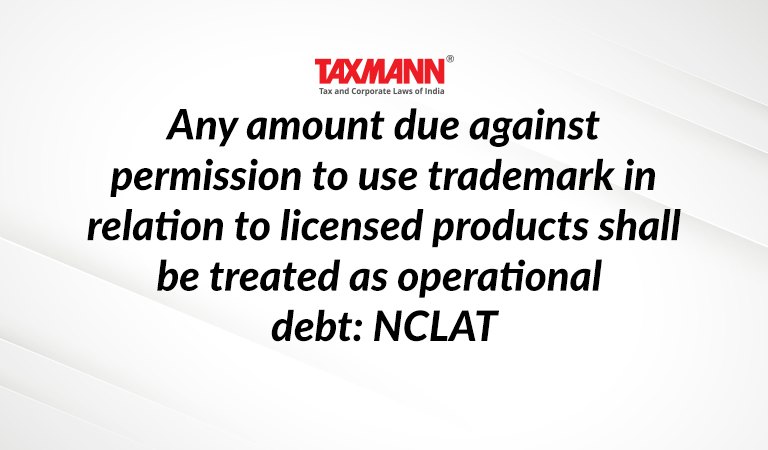Any amount due against permission to use trademark in relation to licensed products shall be treated as operational debt: NCLAT
- Blog|News|Insolvency and Bankruptcy Code|
- 3 Min Read
- By Taxmann
- |
- Last Updated on 6 December, 2022

Case Details: Somesh Choudhary, Suspended Director at Global Fragrances (P.) Ltd. v. Knight Riders Sports (P.) Ltd. - [2022] 145 taxmann.com 149 (NCLAT-New Delhi)
Judiciary and Counsel Details
-
- Justice Anant Bijay Singh, Judicial Member & Mrs Shreesha Merla, Technical Member
- Aditya Sharma, Adv. for the Appellant.
- Vishal Gehrana, Ms Ruby Singh Ahuja, Lakshay Khanna, Jaiveer Shergill & Ms Arti Baluja, Advs. for the Respondent.
Facts of the Case
In the instant case, a Corporate Insolvency Resolution Process (CIRP) was initiated against Corporate Debtor. A license agreement was entered into between the corporate debtor and the respondent, who was the registered trademark owner of the trademark (KKR).
In terms of the agreement, respondent granted an exclusive right and a licence to use its trademark with the licensed products manufactured and sold by the corporate debtor, and the corporate debtor was obliged to pay certain consideration in form of ‘compensation’ to respondent as stated in the agreement.
Later, respondent raised invoices for an amount towards minimum guaranteed royalties payable by corporate debtor under license agreement. Despite several reminders corporate debtor failed in making payment. Consequently, respondent issued a demand notice and filed application under section 9 and same was admitted by NCLT.
Pursuant to which a appeal was preferred claiming that the appellant-director of the corporate debtor submitted that the claim arose out of non-payment of Minimum Guaranteed Royalties, which did not arise out of non-payment of any goods or services and, therefore, could not be an operational debt.
NCLAT Held
Hon’ble NCLAT observed that, corporate debtor was permitted to use trademark in relation to its licensed products, there was temporary transfer/permission to use, constituting ‘provision of service’ rendered by respondent and, therefore, same fell within definition of service and any amounts ‘due and payable’ arising out of such service was an operational debt.
Further, Hon’ble NCLAT held that granting an exclusive right and license to corporate debtor to use trademark in association with licensed products had a direct nexus with business operations and sales also with actual supplied products by corporate debtor and, therefore, claim in respect of such provisions of ‘goods and services’, under terms of agreement, fell within ambit of definition of operational debt.
List of Cases Reviewed
-
- Order of NCLT in (New Delhi) in C.P. No. I.B-1112/ND/2018, dated 5-7-2021 (para 19) affirmed.
- Jaipur Trades Expocentre (P.) Ltd. v. Metro Jet Airways Training (P.) Ltd. [2022] 141 taxmann.com 317 (NCLAT – New Delhi) (paras 13 and 14) followed.
- M. Ravindranath Reddy v. G. Krishan [2020] 113 taxmann.com 526 (NCL-AT) (para 14) distinguished.
List of Cases Referred to
-
- M. Ravindranath Reddy v. G. Krishan [2020] 113 taxmann.com 526 (NCL – AT) (para 2)
- Promila Taneja v. Surendri Design (P.) Ltd. [Company Appeal (AT) (Ins.) No. 459 of 2020, dated 10-11-2020] (para 2)
- Duroflex (P.) Ltd. v. Duroflex Sittings Systems 2014 SCC OnLine Mad 8968 (Mad.) (para 9)
- Shabbir Medical Hall v. Mohammed Naseer 2010 SCC OnLine Mad 2196 (Mad.) (para 9)
- Ramu Hosieries v. Ramu Hosieries 1998 SCC OnLine Mad 452 (Mad.) (para 9)
- Vikas Sales Corpn. v. Commissioner of Sales Tax 1996 taxmann.com 1126/102 STC 106/4 SCC 433 (SC) (para 10)
- Jaipur Trades Expocentre (P.) Ltd. v. Metro Jet Airways Training (P.) Ltd. [2022] 141 taxmann.com 317 (NCLAT – New Delhi) (para 12)
- AGS Entertainment (P.) Ltd. v. Union of India 2013 SCC OnLine Mad 1823 (Mad.) (para 12)
- Jindal Steel & Power Ltd. v. DCM International Ltd. [2017] 86 taxmann.com 270 (NCLT – New Delhi) (para 18).
Disclaimer: The content/information published on the website is only for general information of the user and shall not be construed as legal advice. While the Taxmann has exercised reasonable efforts to ensure the veracity of information/content published, Taxmann shall be under no liability in any manner whatsoever for incorrect information, if any.

Taxmann Publications has a dedicated in-house Research & Editorial Team. This team consists of a team of Chartered Accountants, Company Secretaries, and Lawyers. This team works under the guidance and supervision of editor-in-chief Mr Rakesh Bhargava.
The Research and Editorial Team is responsible for developing reliable and accurate content for the readers. The team follows the six-sigma approach to achieve the benchmark of zero error in its publications and research platforms. The team ensures that the following publication guidelines are thoroughly followed while developing the content:
- The statutory material is obtained only from the authorized and reliable sources
- All the latest developments in the judicial and legislative fields are covered
- Prepare the analytical write-ups on current, controversial, and important issues to help the readers to understand the concept and its implications
- Every content published by Taxmann is complete, accurate and lucid
- All evidence-based statements are supported with proper reference to Section, Circular No., Notification No. or citations
- The golden rules of grammar, style and consistency are thoroughly followed
- Font and size that’s easy to read and remain consistent across all imprint and digital publications are applied



 CA | CS | CMA
CA | CS | CMA
